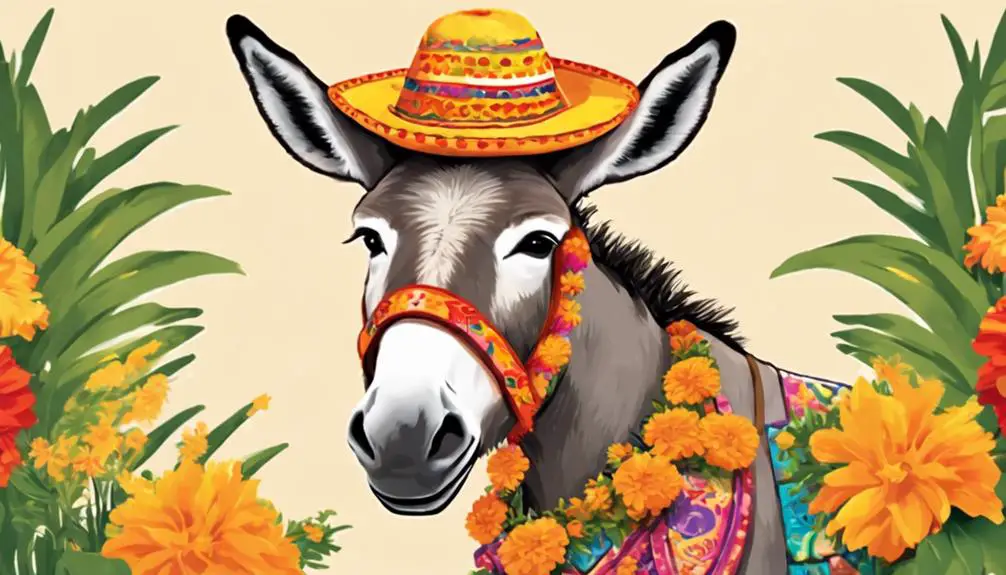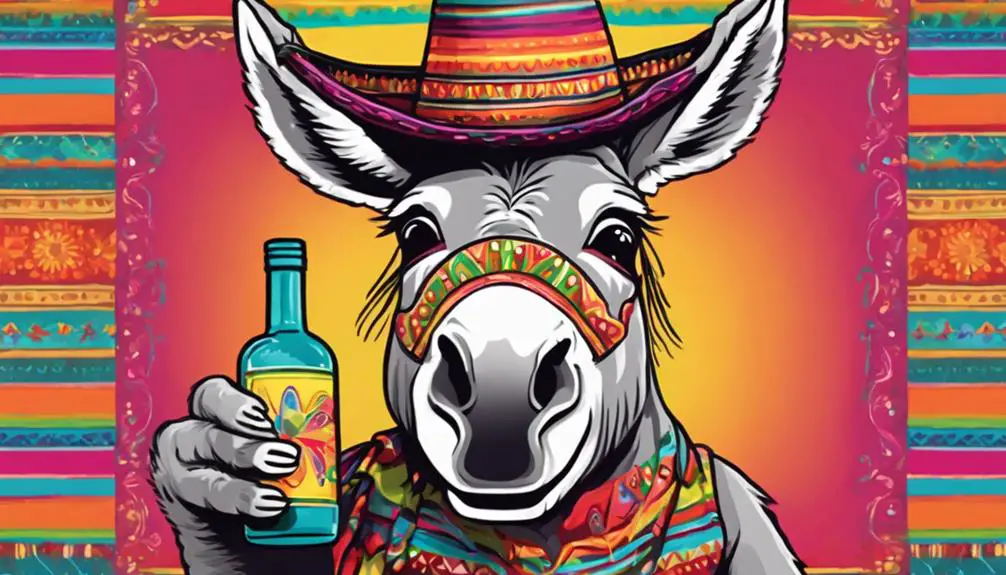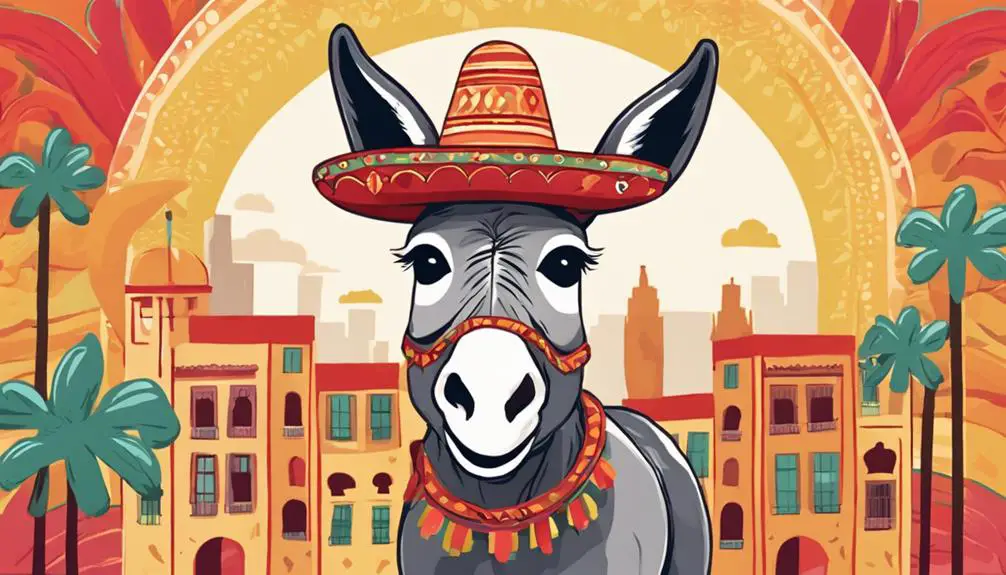When you hear "burro" in Spanish slang, you're often encountering a term that carries a rich history and cultural significance, symbolizing both positive and negative qualities, from obstinacy and stupidity to resilience and determination. This multifaceted term can be used as a term of endearment, to describe clumsiness or intoxication, or to convey intellectual arrogance. Regional variations and cultural contexts further complicate its meaning, making it essential to understand the nuances of "burro" in conversation. As you explore the complexities of this term, you'll uncover a surprising depth of meaning behind this seemingly simple word.
Origins of Burro as an Insult

In the context of Spanish slang, the term 'burro' (donkey) has evolved into a potent insult, with its origins tracing back to the Middle Ages when the animal was seen as a symbol of stupidity and obstinacy. You might wonder how this term became so derogatory. The answer lies in its historical roots.
During the Middle Ages, donkeys were viewed as stubborn and foolish, and these traits were later transferred to humans who were deemed lazy or unintelligent. This cultural significance is important in understanding the evolution of the term.
As you explore the history of 'burro' as an insult, you'll notice that it gained traction in the 16th century, particularly in Spain. The term was often used to describe someone who was slow-witted or refused to adapt to new ideas. Over time, the connotation of 'burro' intensified, and it became a powerful insult in Spanish slang.
Today, you'll hear it used in casual conversations, often to express frustration or annoyance towards someone's behavior.
Regional Variations of Burro
When you explore the nuances of Spanish slang, you'll find that regional variations of 'burro' exist, reflecting distinct cultural and historical contexts that have shaped the term's usage across different parts of the Spanish-speaking world.
As you investigate further, you'll discover that rural dialects in countries like Mexico and Peru use 'burro' to describe someone who's stubborn or obstinate, echoing the animal's reputation for being unyielding.
In contrast, coastal accents in countries like Colombia and Venezuela employ 'burro' to convey a sense of foolishness or ignorance, often in a more playful or humorous tone. These regional variations highlight the complex dynamics of language, where cultural and historical contexts intersect to produce unique meanings and connotations.
Burro as a Term of Endearment

Understanding the term 'burro' takes an unexpected turn as you discover that, in certain cultural contexts, it's crucial to used as a term of endearment, much like 'sweetheart' or 'honey' in English. This usage of 'burro' might seem contradictory, given its literal meaning, but it's a common phenomenon in many languages where words can have multiple connotations.
When utilized in this manner, 'burro' is often employed as a cute nickname, conveying affection and playfulness. It can also be used as a lovely insult, a sweet tease that pokes fun at someone in a lighthearted manner. This term of endearment can be a playful jab, a friendly form of ridicule that strengthens bonds rather than creates tension.
When Burro Means Clumsy or Careless
You'll encounter another side of 'burro' in informal Spanish, where it's used to describe someone who's a bit clumsy or careless, often in a humorous or playful tone. This usage is particularly common among friends or in casual settings, where the term is used to tease or poke fun at someone's clumsy habits or careless mistakes.
| Situation | Description | Example |
|---|---|---|
| Tripping over own feet | Accidentally causing a mess | "¡Eres un burro!" (You're a donkey!) said to a friend who spills coffee on the floor. |
| Forgetting important tasks | Frequently overlooking details | "Soy un burro, olvidé mi tarea de nuevo" (I'm a donkey, I forgot my homework again). |
| Making careless mistakes | Repeatedly making the same error | "Eres un burro, ¿cómo se te olvidó la contraseña?" (You're a donkey, how could you forget your password?) |
| Having poor coordination | Struggling with physical activities | "Soy un burro en el fútbol, siempre tropiezo" (I'm a donkey at soccer, I always trip). |
In these situations, 'burro' is used to lightheartedly criticize someone's careless behavior, often with a hint of humor and playfulness.
Burro as a Drunken State

In informal Spanish, the term 'burro' takes on another connotation, where it's used to describe someone who's extremely intoxicated, often to the point of stumbling or making poor decisions. You might hear your friends say, 'Estoy burro' (I'm burro), implying that they've had one too many drinks. This phrase is often used humorously, acknowledging that one's judgment is impaired due to excessive alcohol consumption.
When you're burro, your alcohol tolerance is likely compromised, and your drinking habits may lead to reckless behavior. You might find yourself doing things you wouldn't normally do when sober. In this state, you're more prone to accidents, injuries, or even conflicts with others.
Recognizing your limits and drinking responsibly is crucial to avoid becoming 'burro.' Remember, being burro isn't a badge of honor; it's a warning sign that you need to reassess your drinking habits. By being mindful of your alcohol intake, you can avoid the negative consequences associated with being 'burro.'
Know-It-All? That's Burro Too
Beyond describing a state of intoxication, the term 'burro' is also used to mock someone who claims to have all the answers, often with an air of superiority. You may have encountered someone who exhibits donkey behavior, stubbornly refusing to listen to others and insisting they know best.
This intellectual arrogance is often accompanied by a condescending tone, making others feel belittled or inferior. When someone is called a 'burro' within this framework, it's a way of pointing out their know-it-all attitude, implying that they're being obstinate and close-minded.
This utilization of 'burro' is a commentary on the individual's behavior, suggesting that they're more interested in asserting their supposed superiority than in engaging in meaningful discussions or learning from others. By labeling someone a 'burro', you're implying that they need to humble themselves and acknowledge the value of others' perspectives.
How to Respond to Being Called Burro

When someone labels you a 'burro', it's important to be aware that it can be a humbling experience, and your response can either escalate the situation or shift the dynamics.
Recognizing that being called a 'burro' can have cultural implications, as it's often used to imply stubbornness or ignorance, is crucial.
To respond effectively, consider setting clear personal boundaries by calmly addressing the issue. You might say, 'I understand that we disagree, but I'd appreciate it if you could explain your perspective without using derogatory terms.' This approach helps to de-escalate tension and encourages a more constructive conversation.
Burro in Latin American Countries
Throughout Latin America, the term 'burro' is often infused with cultural nuances that vary from country to country, reflecting diverse historical and social contexts that have shaped its meaning and connotations.
As you explore the region, you'll discover that the term takes on distinct meanings depending on the country and context. In rural areas, 'burro' often evokes images of a hardworking animal, symbolizing resilience and perseverance. This is particularly true in countries like Mexico and Peru, where rural traditions and agricultural practices have historically relied on donkeys as a means of transportation and labor.
In contrast, in urban centers, the term 'burro' may be used to describe someone who's stubborn or obstinate, reflecting the fast-paced and competitive nature of urban dynamics. For instance, in Argentina and Chile, 'burro' is often used to humorously describe a friend or acquaintance who's being particularly stubborn or resistant to change.
Burro in European Spanish Culture

As you explore European Spanish culture, you'll discover that the term 'burro' assumes a distinct character, often connoting stubbornness or obstinacy, particularly in everyday conversations and idiomatic expressions. This characterization stems from the animal's reputation for being strong-willed and unyielding, traits that are often seen as both admirable and frustrating.
In European Spanish folklore, the donkey is often depicted as a symbol of perseverance and determination. For instance, in Spanish proverbs, the burro is used to illustrate the importance of persistence in overcoming obstacles. This symbolism is rooted in the animal's ability to carry heavy loads over long distances, making it a powerful metaphor for resilience and hard work.
In addition, burro symbolism is also tied to the concept of stubbornness, with the animal's refusal to back down in the face of adversity serving as a cautionary tale about the dangers of obstinacy. By examining the role of the burro in European Spanish culture, you'll gain a deeper understanding of the complex meanings and connotations surrounding this humble creature.
Mastering Burro in Everyday Conversations
In mastering the nuances of 'burro' in everyday conversations, you'll find that understanding the subtleties of its connotations is essential to effective communication in European Spanish culture. By recognizing the various shades of meaning, you can adapt your language to suit the context and avoid misunderstandings.
For instance, using 'burro' to describe someone's stubbornness or foolishness can be perceived as derogatory, whereas employing it in a more playful or humorous tone can lighten the mood.
To integrate 'burro' seamlessly into your conversational flow, focus on the tone and intent behind your words. In casual gatherings, using 'burro' to poke fun at yourself or a friend can foster a sense of camaraderie and shared humor. However, in formal or professional settings, it's important to be more mindful of the term's connotations and opt for more neutral language.
Frequently Asked Questions
Is Burro a Universally Accepted Insult in Spanish-Speaking Countries?
When you navigate the complexities of insults across Spanish-speaking countries, you'll find that cultural nuances and historical context play a significant role.
While 'burro' can be a derogatory term in some regions, its universality as an insult is debatable. You'll discover that certain countries or communities may not perceive it as offensive, whereas others might.
Historical context and cultural sensitivities influence the term's reception, making its impact varied and context-dependent.
Can Women Be Referred to as Burro in Informal Settings?
When considering informal settings, you'll find that gender stereotypes and cultural norms often influence language usage. In many societies, derogatory terms are disproportionately directed towards women.
However, in the context of Spanish-speaking cultures, 'burro' is generally reserved for men, implying foolishness or incompetence. It's unlikely you'll hear women being referred to as 'burro' in informal settings, as cultural norms tend to reserve this term for men, perpetuating gender stereotypes.
Does Burro Have Different Meanings in Formal and Informal Writing?
When you write, you should be aware that certain words can have different meanings depending on the context. In formal writing, you typically aim for a professional tone, avoiding slang and colloquialisms.
However, in informal settings, language evolves, and slang terms can emerge. In this case, 'burro' is a term that may have different connotations in formal and informal writing, with its meaning shifting depending on the tone and audience.
Are There Regional Dialects Where Burro Is Not Used at All?
As you venture into the vast terrain of Spanish dialects, you'll discover that regional variations are the norm, not the exception.
When exploring dialectal differences, you'll find that some regions have distinct preferences for certain words.
In the case of 'burro,' you might be surprised to find that it's not universally used. In fact, some regions opt for alternative terms, showcasing the rich tapestry of linguistic diversity within the Spanish-speaking world.
Can Burro Be Used to Affectionately Tease a Close Friend?
When you use a term to affectionately tease a close friend, you're engaging in a common practice of creating friendship nicknames.
You might give your friend a lighthearted, playful jab, and they'll likely respond in kind. This banter strengthens your bond, as it implies a deep level of comfort and trust.
Under these circumstances, a term like 'burro' could be used to poke fun at your friend's quirks, but only if you're certain they'll take it in stride.
Conclusion
As you navigate the labyrinth of Spanish slang, the burro emerges, a complex creature with multiple faces. Like a chameleon, it adapts to regional dialects, cultural contexts, and social nuances.
It can be a term of endearment, a rebuke for clumsiness, or a description of intoxication. Mastering burro is like taming a wild mustang – it requires finesse, sensitivity, and cultural awareness.
As you ride the waves of Spanish conversation, the burro becomes your trusted companion, a symbol of linguistic agility and cultural sophistication.







